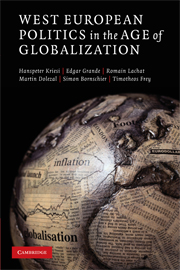Book contents
- Frontmatter
- Contents
- List of figures
- List of tables
- Preface and acknowledgments
- Part I Theory and methods
- Part II Country studies
- 4 France: the model case of party system transformation
- 5 Austria: transformation driven by an established party
- 6 Switzerland: another case of transformation driven by an established party
- 7 The Netherlands: a challenge that was slow in coming
- 8 The United Kingdom: moving parties in a stable configuration
- 9 Germany: the dog that didn't bark
- Part III Comparative analyses
- Appendix A Technical appendix
- Appendix B Detailed statistical results
- References
- Index
7 - The Netherlands: a challenge that was slow in coming
Published online by Cambridge University Press: 05 September 2012
- Frontmatter
- Contents
- List of figures
- List of tables
- Preface and acknowledgments
- Part I Theory and methods
- Part II Country studies
- 4 France: the model case of party system transformation
- 5 Austria: transformation driven by an established party
- 6 Switzerland: another case of transformation driven by an established party
- 7 The Netherlands: a challenge that was slow in coming
- 8 The United Kingdom: moving parties in a stable configuration
- 9 Germany: the dog that didn't bark
- Part III Comparative analyses
- Appendix A Technical appendix
- Appendix B Detailed statistical results
- References
- Index
Summary
Introduction
In their introduction to Dutch politics, Andeweg and Irwin (2005: 19) put the accent on the Netherlands as ‘a country of minorities’, without any doubt, as they maintain, ‘the single most important characteristic of Dutch politics’. During the nineteenth and early twentieth century, although a numerical minority, the Liberals had dominated Dutch politics thanks to franchise restrictions. As the franchise was enlarged, however, they were gradually crowded out of political power and became a minority among others. Those other minorities have been structured by religion and class. Andeweg and Irwin argue that a socio-economic left–right dimension and a religious–secular dimension have always been and still are of crucial importance for the structuration of Dutch politics.
As far as religion is concerned, the Catholics, who corresponded to about one-third of the population in the late nineteenth century, did not constitute the only minority, since the Protestants were divided into a more orthodox and a more mainstream current. The religious groups all created their own parties: in addition to the Catholic party (KVP), the religious differences gave rise to two major Protestant parties – the more orthodox Anti-Revolutionary Party (ARP) and the more mainstream Christian Historical Union (CHU) – next to a host of additional small parties. The class based minority – the working class – entered the political arena relatively late due to the late industrialization of the country.
- Type
- Chapter
- Information
- West European Politics in the Age of Globalization , pp. 154 - 182Publisher: Cambridge University PressPrint publication year: 2008
- 12
- Cited by



